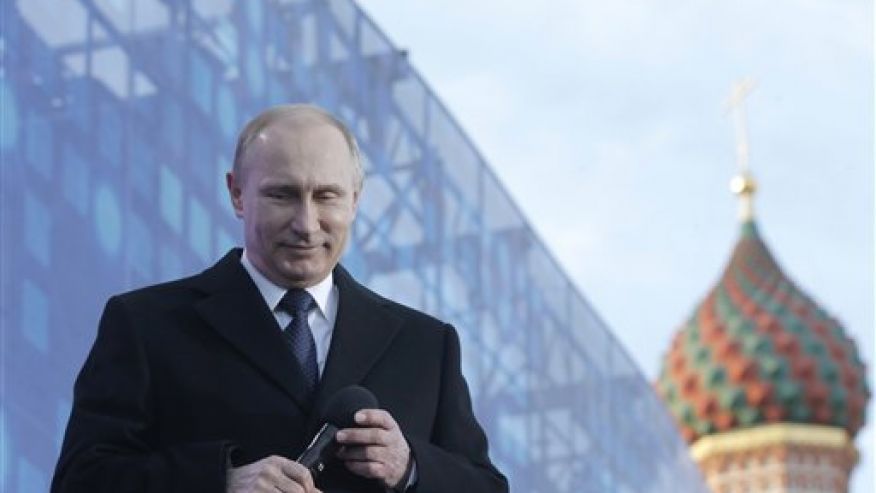 In the 14 months since Russian President Vladimir Putin annexed Crimea and sent proxy fighters to invade eastern Ukraine, Russian companies have won more than $212 million in United Nations contracts to ferry troops, supplies and equipment -- on peacekeeping missions.
In the 14 months since Russian President Vladimir Putin annexed Crimea and sent proxy fighters to invade eastern Ukraine, Russian companies have won more than $212 million in United Nations contracts to ferry troops, supplies and equipment -- on peacekeeping missions.
The tally amounts to nearly one-third -- 32 percent -- of the money U.N. headquarters has spent on peacekeeping air transport during that time, according to the U.N.'s procurement website.
The U.S. pays 28.4 percent of all U.N. peacekeeping expenses, so the Obama administration's contribution to the Russian bottom line amounts to more than $60 million.
The open spigot for Russian air transport firms, despite Putin's aggressive behavior abroad, is based on procurement methods for leased airplanes and helicopters that routinely favored a few winners.
Among other things, that system froze U.S. companies out of the costly and strategically sensitive business. According to U.N. records, only one U.S. firm won an air transport contract between June 2005 and June 2013.

Both U.N. officials and U.S. diplomats now claim that the story is changing -- albeit at a glacial pace that has allowed Russian firms to cash in handsomely even as Putin has orchestrated his thinly disguised Ukrainian adventure.
The U.N. has announced it will hold a June 17 conference for aircraft companies and government officials to roll out a new version of its air charter procurement system, one that a U.N. spokesman says, “provides greater flexibility for new vendors and innovative solutions."
That is an oblique way of saying it will -- perhaps -- introduce actual competition into a charter system that the U.N.'s own auditors have decried since 2009, with little apparent effect, for its skewing of the rules so that only a very few firms could fulfill requirements, competitive pricing was never a requirement, and much of the equipment was dramatically under-used.
One result already is that a U.S. firm has, for a change, won a $15 million U.N. air charter contract, starting in July. The Illinois-based firm, AAR Airlift, which has worked closely with the U.S. Defense Department as well as the U.N. World Food Program, will be chartered for the peacekeeping mission in the Democratic Republic of Congo.
“We have been working on this for many a year," says Isobel Coleman, the U.S. Ambassador to the U.N. for management and reform, a former management consultant. Studiously avoiding any mention of Russia by name, she added that “what was bothersome was that so much [of the U.N. business] was in one country's hands. It was not the best value for the U.N."
It certainly worked out well, though, for a number of Russian air charter companies, led by UTair, a firm headquartered in Russia's central oil-producing regions that, along with its subsidiaries, earned more than $1.3 billion from U.N. peacekeeping business between 2005 and 2013.
UTair continued to rake in loads of peacekeeping money even after Putin moved on
In all, according to U.N. records, the firm and its subsidiaries have won nearly $150 million worth of contracts since that time -- nearly 70 percent of
The biggest single haul for UTair contract awards --$43 million -- was March 2014, as the annexation of Crimea was formalized.
As it happens, that was also the month in which the Obama administration launched a sanctions campaign against Russian individuals and firms with close ties to Putin, to “send a strong message to the Russian government that there are consequences for their actions that threaten the sovereignty and territorial integrity of Ukraine," as the U.S. State Department has put it.
Russian air transport companies were not on the list. Their U.N. peacekeeping tallies have bobbed up and down ever since -- and hit another high of $34.9 million last October, the same month in which Ukraine's beleaguered government won snap elections.
Coleman says that “the point was not lost" on other U.N. member states that Russia was living large on peacekeeping contracts even as the West was trying without much success to roll back Moscow's aggression. But she sticks to the mantra that the changes will allow for a “much broader range" of opportunities for non-U.S. firms as well.
In typical U.N. fashion, however, change has not come without a snail's pace process of testing the waters through a “pilot project" trial of a more open contract bidding process that began in “mid-
The full-blown launch of a fully-competitive process in two weeks is still not guaranteed.
U.S. Ambassador Coleman, for one, anticipates that there will be “push-back" from unnamed “member states that stand to lose" in the new arrangement.
Source: foxnews
 В Атырау -10
В Атырау -10